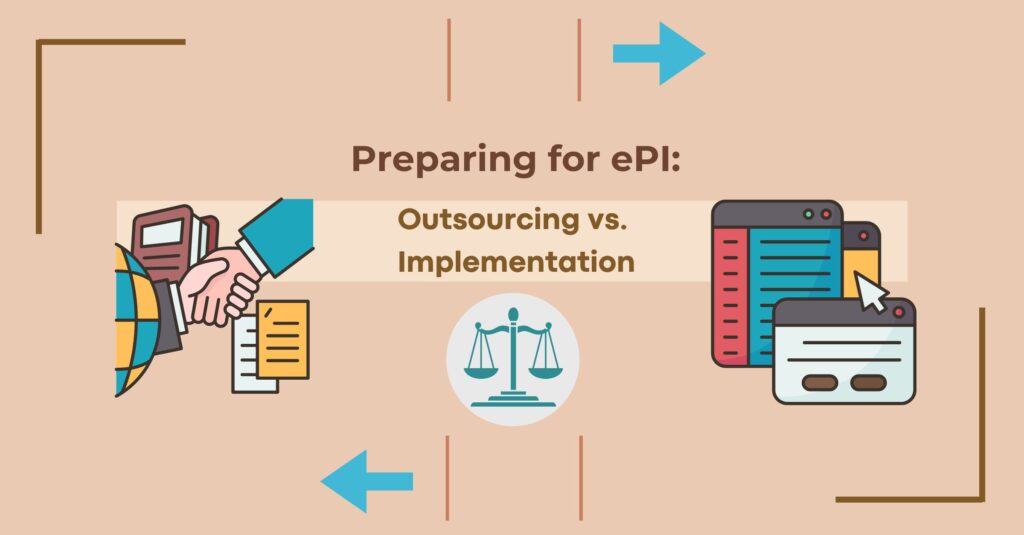
With the push towards Electronic Product Information (ePI) and the adoption of HL7 FHIR and Pharma Ledger standards, pharmaceutical companies face a crucial decision: When is it appropriate to to outsource ePI conversions to a professional service provider and when to to implement an in-house solution for long-term management? The choice is not a one-size-fits-all answer, as factors such as company size, number of products, and frequency of updates all play a role in determining the most cost-effective and efficient path forward.
This blog will explore both options, helping you assess which approach best suits your company’s needs.
Outsourcing ePI: A Viable Starting Point for Many
For many pharmaceutical companies, particularly those new to ePI and FHIR, outsourcing the conversion process is often the best initial step. Tight regulatory deadlines or limited internal expertise can make it challenging to implement a high-quality system in time. Outsourcing allows you to meet regulatory requirements quickly, particularly when you need to submit ePIs by a deadline that doesn’t allow for the longer ramp-up time of implementing a full solution.
Why Outsource?
1. Speed and Expertise
With countries now publishing mandates on when they will require a move to the ePI standard, outsourcing can help meet those requirements faster than building an in-house solution from scratch. Conversion service providers already have the experience and tools in place to generate compliant ePIs quickly.
2. Resource Management
For companies with smaller teams or those already stretched thin, outsourcing frees up internal resources to focus on other mission-critical activities. Pharmaceutical labeling, especially with the complexities of FHIR and Pharma Ledger standards, can be time-consuming and labor-intensive. By outsourcing, your internal teams can remain focused on core tasks without the added burden of managing ePI conversions.
3. A Learning Opportunity
Outsourcing can also serve as a stepping stone toward eventual implementation. By working with an experienced vendor, companies can learn the intricacies of ePI,FHIR, and Pharma Ledger standards. You can start by having a vendor handle conversions while your team gains an understanding of the requirements, with the option to transition to an in-house solution later.
4. Budget Flexibility
Many smaller pharmaceutical companies, which may only need to convert a limited number of leaflets, can benefit from outsourcing due to its cost-effective nature. Paying per conversion on an as-needed basis may be more financially sustainable than investing in a system that will remain underused. Smaller organizations may also explore fixed-term contracts to cover ongoing updates without having to manage the entire process internally.
However, while outsourcing is convenient and efficient for companies with smaller portfolios or those just getting started with ePI, the cost can add up for larger companies with extensive product lines and frequent updates.
Implementing an In-House Solution: Long-Term Savings for Larger Companies
As ePI becomes more widely adopted, larger pharmaceutical companies with a broad product portfolio should consider implementing a comprehensive in-house ePI solution. While there is an upfront cost and time investment, the long-term benefits—both in terms of cost-effectiveness and operational control—are significant.
Why Implement an In-House Solution?
1. Cost Efficiency for Larger Portfolios
If your company has a large number of products and frequently updates labeling information, outsourcing each conversion can become a significant recurring cost. Implementing an in-house system may save money, especially as ePI adoption spreads to more regions. Owning the system allows you to manage label changes and new product submissions in bulk without having to pay for each individual conversion.
2. Full Lifecycle Management
Implementing an in-house solution offers greater control over the entire label management lifecycle—from creation and updates to compliance and archiving. A comprehensive system ensures consistency and accuracy across labels, while also integrating with existing internal workflows.
3. Future-Proofing with Structured Content AI
Structured content AI platforms provide scalable solutions that enable you to manage large volumes of ePI data while adhering to the evolving FHIR and Pharma Ledger standards as well as existing QRD, SPL, and more. With features like natural language processing (NLP), modular content organization, and translation capabilities, an AI-driven solution helps you stay current with new regulatory requirements while automating many of the more labor-intensive processes.
4. Long-Term ROI
While there is an upfront investment, the long-term return on investment (ROI) is clear for large organizations. As more countries move toward ePI, such as the European Medicines Agency (EMA) considering adoption, having an in-house solution will give you the flexibility to adapt quickly to global regulatory changes.
When Should You Consider Implementing?
- Large Portfolio, Frequent Changes: If you manage a large number of products with frequent label updates, the costs of outsourcing can accumulate quickly, making implementation the more cost-effective choice.
- Global Market Presence: If your company operates in multiple markets, consider how quickly different regions are adopting ePI. A large-scale shift, such as if the EMA were to require ePI submissions, will dramatically increase your labeling workload. At that point, implementation would offer more control and scalability than outsourcing.
- Strategic Investment: If you view the adoption of ePI as part of your long-term digital transformation strategy, an in-house solution will provide the necessary infrastructure for future growth.
When to Stick with Outsourcing
Smaller pharmaceutical companies, or those with only a few products, may find that outsourcing remains the most practical option even as ePI adoption grows. With fewer products to manage, the cost of implementing a full system might not justify the investment. In these cases, outsourcing can offer the flexibility needed without tying up capital in infrastructure that won’t be fully utilized.
Some factors to consider when determining if outsourcing is the right long-term solution include:
- Product Volume: If you manage a limited portfolio, outsourcing may be more efficient.
- Update Frequency: If your products don’t require frequent label changes, the cost of implementation might outweigh the benefits.
- Market Considerations: If the regions where you operate have not yet adopted ePI or are moving slowly toward compliance, the pressure to implement a system may not be as immediate.
Final Thoughts: Choosing What’s Right for You
The decision between outsourcing ePI conversions and implementing an in-house solution comes down to your company’s unique needs. Larger organizations with extensive portfolios will likely benefit more from long-term implementation, while smaller companies can save time and resources by continuing to outsource. Regardless of which path you choose, ensuring compliance with ePI FHIR and Pharma Ledger standards is crucial as the global regulatory landscape continues to evolve.
At Glemser, we offer both options to help you meet your ePI requirements efficiently, whether you’re looking to outsource conversions or implement a robust in-house solution. Our expertise in structured content AI ensures that whatever route you take, your regulatory content is in good hands.
How are you preparing for ePI? Contact Glemser today to get started.


